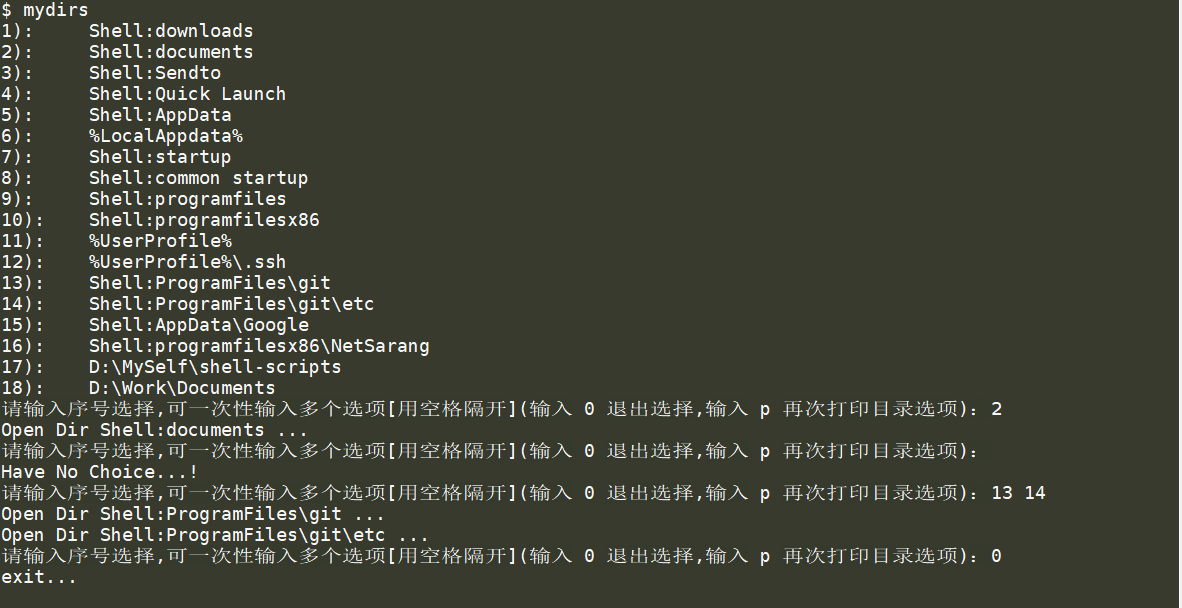favorite-dirs函数
如需使用第三方软件或插件打开文件夹路径,只需替换代码中的explorer.exe为第三方软件可执行文件名即可,比如可以替换成total commander等软件的可执行程序;(注意可能需要填写软件程序的完整路径),
favorite-dirs() {
#使用资源管理器快速打开Windows系统常用文件夹
local mydirs=$(cat<<EOF
Shell:downloads
Shell:documents
Shell:Sendto
Shell:Quick Launch
Shell:AppData
%LocalAppdata%
Shell:startup
Shell:common startup
Shell:programfiles
Shell:programfilesx86
%UserProfile%
%UserProfile%\.ssh
Shell:ProgramFiles\git
Shell:ProgramFiles\git\etc
Shell:AppData\Google
Shell:programfilesx86\NetSarang
D:\MySelf\shell-scripts
D:\Work\Documents
EOF
)
#输出选择菜单:
echo "$mydirs"|awk '{printf NR"): ";print}'
while :;
do
read -p "请输入序号选择,可一次性输入多个选项[用空格隔开](输入 0 退出选择,输入 p 再次打印目录选项):" dirChoose
if [ ! -z "$dirChoose" ];then
if [[ "${dirChoose,,}" == "p" ]];then
echo "$mydirs"|awk '{printf NR"): ";print}'
continue
fi
if [[ "$dirChoose" == "0" ]];then
echo "exit..."
break
fi
open-single-dir() {
#local targetDir=$(echo "$mydirs"|awk "NR==$dirChoose"'{gsub(/^\s*/,"");print;exit}')
local targetDir=$(echo "$mydirs"|awk "NR==$1"'{gsub(/^\s*/,"");print;exit}')
if [ ! -z "$targetDir" ];then
echo "Open Dir $targetDir ..."
cmd /c explorer.exe "$targetDir "
else
echo "targetDir is empty!"
fi
}
mapfile -t -d $' ' myDirArr<<<"$dirChoose"
for dir in ${myDirArr[@]};
do
#echo "open dir:$dir"
open-single-dir $dir
done
else
echo "Have No Choice...!"
fi
done
}
alias mydirs='favorite-dirs'
alias d3='favorite-dirs'

二次修改完善版:
增强功能:
1、合并paths函数实现的功能,从/v/bin/dirs.conf文件中载入附加配置路径到代码中预定义的常规路径,统一进行操作;
2、支持传递$1参数对路径进行关键字搜索;
3、交互中支持使用通配符 * 选择所有目录选项;
4、支持使用命令行参数--open xxx指定第三方程序替代explorer.exe打开目录;
5、支持定义多个alias复用函数代码以不同程序打开指定的目录路径;
如:Total Commander、Everything、VSCode、Cygwin、自定义bat,vbs脚本,第三方exe程序等...
favorite-dirs() {
#使用资源管理器快速打开Windows系统常用文件夹
local mydirs=$(cat<<EOF
Shell:downloads
Shell:documents
Shell:Sendto
Shell:Quick Launch
Shell:AppsFolder
Shell:AppData
%LocalAppdata%
Shell:startup
Shell:common startup
Shell:programfiles
Shell:programfilesx86
%UserProfile%
%UserProfile%\.ssh
Shell:ProgramFiles\git
Shell:ProgramFiles\git\etc
Shell:AppData\Google
Shell:programfilesx86\NetSarang
D:\MySelf\shell-scripts
D:\Work\Documents
EOF
)
#追加paths/d函数使用的书签文件到本函数目录列表;
local mydirs="$mydirs"$'\n'"$(cat /v/bin/dirs.conf)"
local openerTool="explorer.exe"
while :;
do
#如果传入了$1参数,则对目录列表进行关键字搜索,而后仅列出匹配关键字的结果
if [ $# -eq 1 -a ! -z "$1" ];then
local mydirs=$(echo "$mydirs"|grep -i "$1")
break
elif [ $# -ge 1 ] && [[ "${1,,}" == "--open" ]];then #指定了额外程序替代资源管理器的情况
shift
if [ ! -z "$1" ] && [[ ! "$1" =~ ^\- ]];then
local openerTool="$1"
echo "使用 $openerTool 打开文件夹 ..."
shift
fi
elif [ $# -ge 1 ];then
local mydirs=$(echo "$mydirs"|grep $@)
break
else
break
fi
done
#echo "跳出参数解析..."
#输出选择菜单:
echo "$mydirs"|awk '{printf NR"): ";print}'
set -f #关闭通配符拓展
while :;
do
read -p "请输入序号选择,可一次性输入多个选项[用空格隔开](输入 0 退出选择,输入 p 再次打印目录选项):" dirChoose
if [ ! -z "$dirChoose" ];then
if [[ "${dirChoose,,}" == "p" ]];then
echo "$mydirs"|awk '{printf NR"): ";print}'
continue
fi
if [[ "$dirChoose" == "0" || "${dirChoose,,}" == "q" ]];then
echo "exit..."
break
fi
open-single-dir() {
#local targetDir=$(echo "$mydirs"|awk "NR==$dirChoose"'{gsub(/^\s*/,"");print;exit}')
local targetDir=$(echo "$mydirs"|awk "NR==$1"'{gsub(/^\s*/,"");print;exit}')
if [ ! -z "$targetDir" ];then
#echo "Open Dir $targetDir ..."
#cmd /c explorer.exe "$targetDir"
if [[ "$targetDir" =~ ^[a-z]:\\ || "$targetDir" =~ ^/cygdrive/ || "$targetDir" =~ ^/ ]];then #常规路径模式下判断文件夹是否存在
if [ ! -e "$targetDir" ];then
#echo -e "targetDir not exist!\n==>$targetDir"
print_color 9 "targetDir not exist! ==> $targetDir"
else
echo "Open Dir $targetDir ..."
#cmd /c explorer.exe `cygpath -aw "$targetDir"`
cmd /c "$openerTool" `cygpath -aw "$targetDir"`
fi
else #适配Shell:模式或Windows原生环境变量模式;
echo "Open Dir $targetDir ..."
#cmd /c explorer.exe "$targetDir"
cmd /c "$openerTool" "$targetDir"
fi
else
echo "targetDir is empty!"
fi
}
if [[ "$dirChoose" == "*" ]];then #打开当前列表所有文件夹
local dirCount=$(echo "$mydirs"|wc -l)
for dir in `seq 1 1 $dirCount`;
do
open-single-dir $dir
done
##以下这行接收到通配符即退出函数,为了方便在命令行执行 `dvscode 'Work\\Company' <<<"*"`这样的命令
break
else
mapfile -t -d $' ' myDirArr<<<"$dirChoose"
for dir in ${myDirArr[@]};
do
#echo "open dir:$dir"
[[ "$dir" == "0" ]] && { echo "exit...";return; }
open-single-dir $dir
done
fi
else
echo "Have No Choice...!"
fi
done
set +f #还原通配符拓展
}
alias mydirs='favorite-dirs'
alias d3='favorite-dirs'
alias dtc='favorite-dirs --open tcopen.bat'
alias d4='favorite-dirs --open tcopen.bat'
alias dcr='favorite-dirs --open tcopen.bat'
alias dcl='favorite-dirs --open tcopen-left.bat'
#alias deverything='favorite-dirs --open D:\\Extra\\AcmeKit\\Everything.exe -p'
alias deverything='favorite-dirs --open openeverything.bat'
alias d5='deverything'
alias ds='deverything'
alias dvscode='favorite-dirs --open vscode.bat'
alias dcygwin='favorite-dirs --open cygwin-dir.bat'
alias dmintty='favorite-dirs --open cygwin-dir.bat'
附:老版本的 paths 函数功能代码:
paths() {
## 存储一些常用的文件夹路径,d命令终端输出
## 按住Ctrl键,鼠标单击条目即快速打开
local apppath="/v/bin/dirs.conf"
if [ -e "${apppath}" ];then
if [ $# -eq 1 -a -d "$1" ];then
echo "$1" >>${apppath}
echo "add $1 To ${apppath} Done..."
return
elif [ $# -eq 1 ] && [[ "${1,,}" == "-c" || "${1,,}" == "--check" ]];then
# $1==-c/--check 查询路径是否存在,以不同颜色显示进行区分
local paths=$(cat ${apppath}|cygpath -u -f-|sed -r 's/\s/\?/g')
for pathItem in ${paths[@]}
do
OLD_IFS=$IFS
IFS=$(echo -e "\n")
local showPath=$(echo $pathItem|sed -r 's/\?/\\\\ /g')
if [ -e "$showPath" ];
then
echo -e "`echo $showPath|sed -r 's/\s/\\\ /g'`\t存在"
#print_color 3 `echo $showPath|sed -r 's/\s/\\\ /g'`
else
#echo "$showPath 不存在"
print_color 9 "${showPath}\t不存在"
fi
IFS=$OLD_IFS
done
elif [ $# -eq 1 ];then
cat ${apppath}|grep -i "$1"|cygpath -u -f-|sed -r 's/\s/\\\ /g'
else
#cat ${apppath}|cygpath -u -f-|sed "s/^/'/;s/$/'/"
#以下处理为兼容路径中包含空格的情况
cat ${apppath}|cygpath -u -f-|sed -r 's/\s/\\\ /g'
fi
else
echo -e "dirs configure file not found!\npath:${apppath//\\/\\\\} "
fi
}
alias d=paths
alias d2='paths --check'
附:获取wshShell SpecialFolder 的VBS代码:
'获取Windows特殊文件夹的真实路径,如,Shell:Desktop、Shell:Appdata等
'See:https://docs.microsoft.com/en-us/previous-versions//0ea7b5xe(v=vs.85)?redirectedfrom=MSDN
Option Explicit
'On Error Resume Next
Dim WshShell,splRegExp,rplRegExp,TargetPathArr
Dim targetPath,suffixTargetPath,targetPathAppend,strShellPath
IF Wscript.Arguments.Count<1 Then
Wscript.Echo
Wscript.Quit
End If
targetPath=Wscript.Arguments(0)
targetPathAppend=""
Set WshShell = WScript.CreateObject("WScript.Shell")
Set splRegExp = New RegExp
splRegExp.Pattern = "(\\.*)$"
splRegExp.IgnoreCase = True
splRegExp.Global = True
Set TargetPathArr = splRegExp.Execute(targetPath)
If TargetPathArr.Count>=1 Then
'Wscript.Echo TargetPathArr(0)
targetPathAppend=TargetPathArr(0)
End If
Set rplRegExp = New RegExp
rplRegExp.Pattern = "(^shell:|\\.*$)"
rplRegExp.IgnoreCase = True
rplRegExp.Global = True
suffixTargetPath = rplRegExp.Replace(targetPath,"")
strShellPath = WshShell.SpecialFolders(suffixTargetPath)
IF strShellPath="" Then '没有获取到SpecialFoldersFolder结果则直接输出空,不追加路径后缀
WScript.Echo
Else
WScript.Echo strShellPath & targetPathAppend
End If